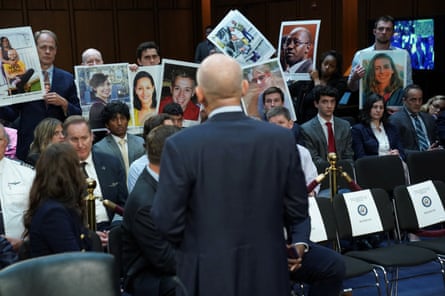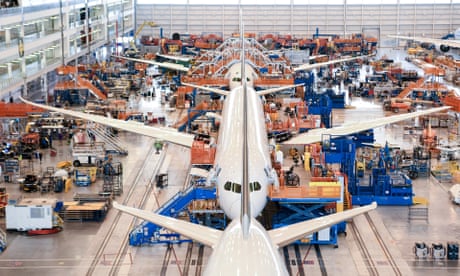Guardian:
Senators also say executives ‘sticking it to your employees’ as another whistleblower comes forward

The CEO of Boeing has acknowledged “something went wrong” at the embattled planemaker after another whistleblower came forward, alleging that corners were cut on its production line.
Dave Calhoun acknowledged some employees who raised concerns about safety and quality inside the company faced retaliation.
The executive did not have the number of managers fired for retaliating against whistleblowers “on the tip of my tongue”, he told senators, “but I know it happens”.
At a hearing entitled “Boeing’s Broken Safety Culture”, Richard Blumenthal, chair of the Senate Permanent Subcommittee on Investigations, declared that the company was facing a “moment of reckoning” – and called for prosecutions.
In heated exchanges, Calhoun – who has already announced plans to step down later this year – and Boeing executives were accused of “strip mining” the company for profit. “You’re cutting corners, you’re eliminating safety procedures, you’re sticking it to your employees,” said Josh Hawley, the Republican senator.
“It’s working out great for you,” Hawley added, citing Calhoun’s “extraordinary” $33m pay package and asking why he had not yet resigned. “I’m sticking this through,” Calhoun replied. “I am proud of every action we have taken.”
Hours before the session Sam Mohawk, a quality assurance inspector for the company in Renton, Washington, became the latest Boeing employee to go public with claims of safety issues. He alleged that he was instructed by his supervisors to conceal evidence from regulators.
Boeing has come under intense scrutiny since a terrifying cabin panel blowout in January prompted fresh questions about quality and safety.

“More than a dozen” whistleblowers have now come forward, according to Blumenthal, who urged other concerned workers at Boeing to contact his office. “Boeing needs to stop thinking about the next earnings call and start thinking about the next generation.”
Calhoun insisted that he did not “recognize any of the Boeing you describe” when senators accused the company of weakening safety systems. “Our culture is far from perfect,” he said, “but we are taking action, and we are making progress.”
As he spoke, the families of victims of two Boeing plane crashes, in 2018 and 2019, in which 346 people were killed, and whistleblowers who spoke out about their experiences at the company, were sitting with him in the room.
Turning to the families before starting his evidence, Calhoun apologized to them directly for their “gut-wrenching” losses.
The company has delivered a quality improvement plan to the US Federal Aviation Administration (FAA), and claimed that employees have been emboldened to come forward with safety and quality concerns on the factory floor.
But accounts from inside Boeing’s facilities have raised further questions. Earlier this month the Guardian reported on claims the firm’s largest factory was in “panic mode”.
Whistleblowers including Sam Salehpour, a current engineer at Boeing, and Roy Irvin, a former quality investigator, have gone public with allegations about safety in recent months.
“This is a culture that continues to prioritize profits, push limits and disregard its workers,” Blumenthal said of Boeing before Tuesday’s hearing. “A culture that enables retaliation against those who do not submit to the bottom line. A culture that desperately needs to be repaired.”
Blumenthal said Mohawk recently told the panel he had witnessed systemic disregard for documentation and accountability of nonconforming parts.
In a report released by the committee, Mohawk said his work handling nonconforming parts became significantly more “complex and demanding” after the resumption of production of the 737 Max, its bestselling commercial jet, in 2020. Production had been suspended following the two crashes in 2018 and 2019.
Mohawk alleged the number of nonconformance reports soared 300% compared with before the grounding of the Max. The 737 program lost parts that were intentionally hidden from the FAA during one inspection, he claimed.
Mohawk filed a related claim in June with the Occupational Safety and Health Administration, a federal regulator.
Boeing said: “We received this document late Monday evening and are reviewing the claims. We continuously encourage employees to report all concerns as our priority is to ensure the safety of our airplanes and the flying public.”
Reuters contributed reporting

No comments:
Post a Comment